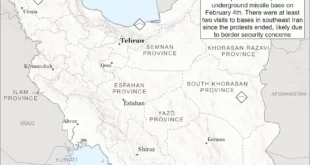 TEHRAN (FNA)- Oil prices rose more than $1 on Monday after energy firms in the US Gulf shut down nearly all offshore oil output and a host of flood-prone coastal refineries ahead of Hurricane Gustav, the biggest threat since 2005’s devastating Katrina.
TEHRAN (FNA)- Oil prices rose more than $1 on Monday after energy firms in the US Gulf shut down nearly all offshore oil output and a host of flood-prone coastal refineries ahead of Hurricane Gustav, the biggest threat since 2005’s devastating Katrina.
But prices pared some bigger earlier gains as traders waited to see whether Gustav would leave lasting damage in its wake after it slams into the Louisiana coast later in the day as a major Category 3 hurricane.
US light crude for October delivery rose $1.11 to $116.57 a barrel by 0303 GMT, having briefly surged above $118 a barrel when the New York Mercantile Exchange (NYMEX) opened for electronic trading several hours earlier than usual.
London Brent crude rose 97 cents to $115.02.
US RBOB gasoline futures outpaced crude gains to rise 5.08 cents, or 1.8 percent, to $2.9050 per US gallon, as traders feared the refining sector could be harder hit.
But oil prices have still barely recovered from last month’s over three-month low of nearly $111, with buyers cautious even after the steep slump from mid-July’s record high $147.27.
“This is definitely a dangerous storm but I think most of the market is in a wait-and-see mode, waiting to see (if there are) disruptions to oil facilities and pipeline infrastructure before they make a big move,” said Gerard Burg, a commodities analyst at the National Bank of Australia in Melbourne.
“Investors are a lot more cautious now, given the general bearish sentiment in the market.”
Energy companies are taking no chances, shutting down more than 96 percent of US Gulf oil production and 82 percent of natural gas output as of Sunday afternoon, the US Minerals Management Service said. The Gulf normally pumps a quarter of all US production and about 15 percent of its domestic natural gas.
At least nine oil refineries with a combined capacity of 2.2 million bpd were shut down and a half-dozen other refineries had reduced throughput because of the storm.
The shutdown of key infrastructure, including the Henry Hub delivery point and the Louisiana Offshore Oil Port, prompted NYMEX on Sunday to declare force majeure on all delivery obligations under its August and September natural gas futures.
Forecasters predicted Gustav will make landfall west of New Orleans around midday on Monday, with top winds expected to be around 200 kph (125 mph), making it a Category 3 storm on the five-step intensity scale.
Geopolitical tensions between Russia and the West also lent support to oil prices.
Russia does not want a confrontation with the West but will hit back if attacked, Kremlin leader Dmitry Medvedev said on Sunday, a day before EU leaders meet to draft a response to Moscow’s actions in Georgia.
Russia, the world’s largest exporter of natural gas and the second-largest oil exporter, supplies more than a quarter of Europe’s gas needs.
Iran’s oil minister said on Sunday $100 a barrel was the lowest acceptable price for crude oil. Iran, the second-largest producer in the Organization of Petroleum Exporting Countries, has said the oil market is oversupplied in recent weeks as oil prices have plunged more than $30 a barrel from their peak.
OPEC ministers are scheduled to meet in Vienna on Sep. 9 to review the organizations output policy. The group is also expected to hold an extraordinary meeting in Algeria in December.
OPEC members say that the market is well-supplied and that factors beyond their control, such as speculation, a weakening US dollar, inadequate refining capacity and geopolitical tensions were behind the drive in crude oil prices in the past few months.
Iranian officials blame sanctions that have been imposed against Tehran as a major contributory factor to the last year rise in prices.
Analysts view US-led sanctions against Iran and geopolitical factors as among the main causes of recent hike in oil prices, saying that fears of a new Middle East conflict are behind the new high for oil prices.
Market analysts, specially those from consumer nations, take Bush administration responsible for the price hikes during the last year, saying that these are frequent sanctions and the “rumors of US and Israeli action against Iran circulating in the markets” that affected oil and the dollar.
Prices dropped by around 20 dollars last month after West softened rhetoric in the dispute with Iran.
 Eurasia Press & News
Eurasia Press & News



